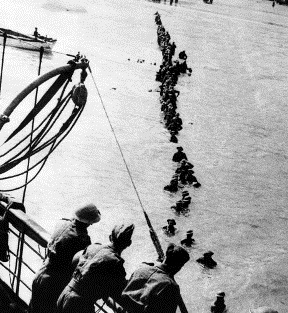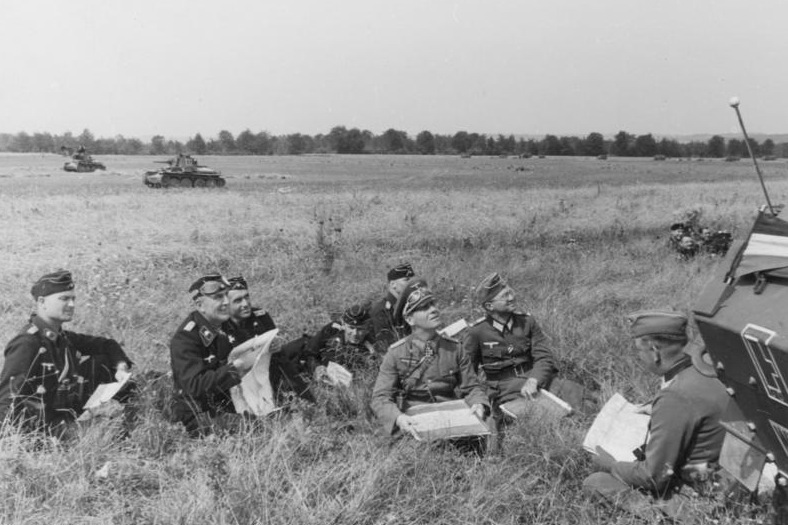Dunkirk anniversary: A British disaster which sowed seeds of Cold War
When the Nazis launched Operation Barbarossa, Russia was unable to count on Allied forces, creating lasting suspicion.
This week you will see myriad tributes to Dunkirk, the plucky derring-do of the little ships and the blundering hubris of the Nazis. It's the perfect story, which feeds into the British self-image: A gallant, daring underdog overcoming an evil bully from the continent. No wonder it is burned so deeply into the story of our nation.
But the mythology of Dunkirk masks a variety of uncomfortable truths for the British. Not least of those is the fact that Britain's evacuation left a lingering sense of resentment in France, and her withdrawal from the European theatre of war left Russia standing alone when Hitler turned east a year later.
When the Nazis launched Operation Barbarossa, Russia was unable to count on the support of Allied forces. This created lasting suspicion among Russian people, helping to create the tension which continues to colour relations between east and west today.
The Dunkirk tub-thumpers may point out that over 110,000 French and Belgian troops were rescued during the evacuation, a third of the overall number of evacuees. But one must also remember that the Dunkirk evacuation came about because of a catastrophic misjudgement by British high command, which left the French to bear the brunt of the German onslaught in spring 1940, an attack which cost them half a million men.
At the outset of the campaign the British grouped all their major ports to the west, as far as Britanny, to ensure they were out of range of German bombers. This made perfect sense, until the Germans broke through at Sedan, by which time the British force had moved into Belgium. Guderian's division cut the Allied communication routes in half near Abbeville and the Nazi force kept going west until they hit the coast.
This left the British force completely redundant in Belgium. They were stranded, miles away from their supply ports. The soldiers were denied their food, mail and ammunition, and nothing between the two armies was common. Our troops weren't able to fire Belgian ammo, and there was no way of replenishing their materiel. It was like a revolving door; the further the Germans pushed into France, the further the British were wedged out of the conflict.


Psychological stranglehold
The whole campaign was a calamitous cock-up. The Nazis had fewer aircraft, men and tanks than the Allies, but they used them more effectively. The German armour was concentrated at the arrowhead, and, even though they were surrounded when they broke through, the Allies allowed this psychological stranglehold to develop; they felt the Germans had got behind them, and, from the British perspective, the only available option was withdrawal.
This, of course, meant that we left France to the Nazis for four years. During the period of Nazi occupation almost 70,000 French Jews were sent to concentration camps, and the actions of Gestapo henchmen such as Klaus Barbie cast a lasting shadow over the country. Many French people still refer to the war as lasting from 1940 to 1944, as their suffering was contracted into that period, and magnified.
For the Russians, meanwhile, the great patriotic war was a war of immense loss; between Dunkirk and D-Day we, the British, could do very little to help them. When Stalin was told the Allies had landed in Normandy on 6 June 1944, a full four years after Dunkirk, he replied "about f***ing time."
That impression is still embedded in the spirit of modern Russia, and their suspicion of the western powers. I was recently taken to a monument near Moscow, the high watermark of the Nazi advance during Operation Barbarossa, almost at the gates of the Kremlin. My guide told me 'this is where we stopped you'. I replied that I wasn't German, and he said it didn't matter, he viewed all Europeans as the same.
Dunkirk suggested to Russia that they were on their own; the Allied powers, which at that time did not include America, were powerless to help them. The western powers were seen as incompetent, impotent and ambivalent to the cost of Russia's Great Patriotic War.
The animosity which scarred the post-war period was a logical extension of this feeling, and those who are celebrating Dunkirk as some kind of victory should bear that in mind.

Andy Robertshaw is a freelance military historian and a world-renowned expert on World Wars I and II. He has appeared on several BBC documentaries, including Finding the Fallen, Trench Detectives and First and Last. He also served as an actor and historical advisor on Stephen Spielberg's WWI film Warhorse.
Andy has created his own World War I trench in Charlwood, Surrey where people can experience life in the First World War for themselves. You can find out more about the trench here [The Trench - Andy Robertshaw] or go to www.andyrobertshaw.com to read more about Andy and his work.
© Copyright IBTimes 2024. All rights reserved.





